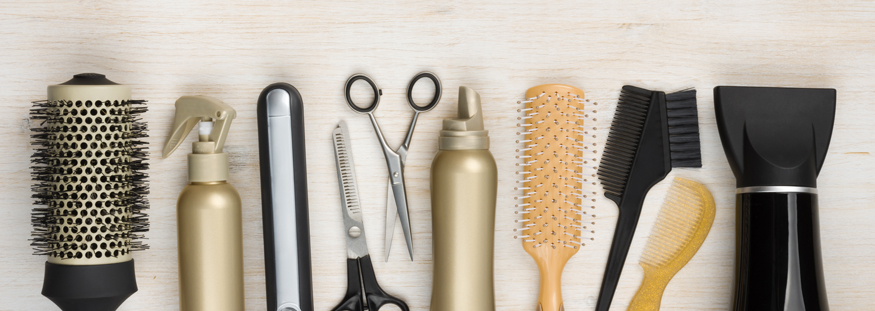
How to Open a Hair Salon: A Step-by-Step Guide

The beauty industry is an extremely lucrative sector. In fact, according to Global Data, health & beauty will be the fastest growing sector in the five-year period between 2017-2022.[1] So if your dream is to own a beauty salon, now might be the time to do it!
If you’re not sure what you need to open a salon, or what steps to take, here’s our ‘opening a salon checklist’ to help you find your feet.
10 Steps for opening a hair salon:
- Think of classy hair salon names
- Create a hair salon business plan
- Check the requirements to open a hair salon
- Choose your treatments
- Explore funding options
- Choose your premises
- Buy equipment and furniture
- Get business insurance
- Consider hiring employees
- Market your hair salon

1) Think of classy hair salon names
Possibly one of the most exciting parts of opening a salon is deciding on the name! It’s also one of the most important steps, as the name you choose will represent who you are as a business and what you can offer the market.[2]
Think outside the box and come up with unique hair salon ideas that really set the scene. You want the name of your salon to conjure up an image in the mind of customers of the kind of environment and experience they can expect from your salon. Whether you want to be known as an upmarket haven of relaxation, or a fun and upbeat salon that suits a younger clientele, choose a name that emulates this.[3]
Come up with something memorable and unique; something that is easy to pronounce and remember. Lots of salon owners incorporate their own name into the name of their business or use a play on words if the brand image is more laid-back than luxury.[4]
Something to be mindful of when choosing the name of your salon is that it doesn’t sound like another local salon’s name and that the name isn’t trademarked. The last thing you want when you’re just starting out is a legal battle![5] You may also want to check that your chosen name is available as a website domain, so you can set up a business site without hassle.[6]
2) Create a hair salon business plan
Starting a business takes careful organisation and planning to decipher everything from how much money is needed to get started, where the business will run from and what services will be offered.
Put together a business plan for your salon, that not only considers your goals and how you intend to achieve them, but also your understanding of the market and how your salon will stand out from competition.[7]
Here are a few things that you should cover in your business plan:
- A summary – an overview of the whole plan, including goals, location and budget.
- A description – what type of salon you want to be, what services you’ll offer and what your USP is.
- Market research – a demonstration of your knowledge of your target market and the successes/failures of local competing businesses.
- A marketing plan – a consideration of how your salon will compete with others in the area and how you will market it. Will you use traditional marketing, social media, word of mouth, etc.?
- A financial plan – financial information such as an estimated budget and financial projections.[8]

3) Check the requirements to open a hair salon
In the UK, there are no legal requirements per se when it comes to becoming a hairdresser and it is possible to learn on the job, however, most people in the industry will gain industry recognised qualifications before starting a career in the sector. Plus, unless you’re starting a trainee scheme, you will need a qualification to land a role in a salon. You can gain these qualifications at college or through an apprenticeship.[9]
Here are a few different options for qualifying as a hairdresser:
- Get a National Vocation Qualification (NVQ) – There are four levels to an NVQ. Level 1 is a basic introduction which isn’t considered a standalone qualification but allows you to move onto Level 2 – which is the minimum qualification for a salon role. Levels 3 and 4 teach more advanced, technical skills that are desirable for management roles.
- An apprenticeship – If college isn’t for you, you can gain your NVQ via an apprenticeship. This will combine on the job training and classroom learning, allowing you to earn money as you study.
- Workplace assessment – If you start working in a salon in an assistant role, you may have the option to qualify as a hairdresser on the job.
- Salon management courses – Before opening your own salon, you may want to consider a management course. There are a range of Foundation (Fda) and Bachelors (BA Hons) degrees in salon management available across the UK, that teach business management skills.[10]
Another consideration when opening a hair salon, is that you may need to register your beauty business with your local council so that they can check you are following health and safety regulations. These rules include making sure your premises are clean, well-lit and well-ventilated; making sure you take precautions against infection or contamination; making sure your staff work hygienically and use equipment efficiently; and proving that you have professional, treatment and public liability insurance.[11] One of the most important laws which hairdressers must abide by relates to the handling and application of hair dyes and shampoos, as some can be hazardous, causing conditions such as dermatitis.[12]
It’s possible that the council will want to charge a fee and check the premises before they issue a certificate of registration. Once you have the certificate, you must display a copy in the salon, where it can be seen by customers.[13]

4) Choose your beauty treatments
You probably have a rough idea of the treatments and services your business will offer at this point, but now’s the time to give it some real thought. While some hair salons stick strictly to hair services, others offer a wide range of beauty treatments.
Here are some of the treatments that are commonly offered by salons:
- Haircut and colour
- Specialist hair treatments – extensions, chemical straightening, perms
- Conditioning hair treatments
- Manicures and pedicures
- Eyebrow shaping & grooming
- Hair removal treatments
- Massages
- Tanning services
- Professional make-up and makeovers[14]
5) Explore funding options
As with any other business, you’re going to need a certain amount of funding to get your salon off the ground.[15] If you haven’t got a lump sum set aside for setting up shop, you may need to consider a bank loan or another funding option.
If that’s the case, you need to carefully consider how much money you will need and how you will pay it back. Think about what equipment you need; how much your premises will cost and what bank charges you may need to cover.[16]
In the UK, it’s possible to apply for a government-backed Start Up Loan of between £500 and £25,000, which includes free guidance to help write your business plan and free mentoring.[17]
How much does it cost to open a salon
The cost of opening a salon could range anywhere between £3,000 and £35,000 depending on your premises and how much work is needed.[18]

6) Choose your hair salon premises
The location and premises for your business can be hugely impactful on the success of your hair salon. While some salons can do perfectly well being tucked out of sight, you’ll greatly improve your chances of attracting new business if you find a location with plenty of footfall and passing traffic.[19]
Other things to consider are the availability of parking, the size of the premises, the type of people who live in the area (and whether they fit your target market), and how many other salons there are in the area. There’s no point setting up your salon in an area saturated with competitors, as it could prove a struggle to attain customers, however, it is worth choosing a location near shops or cafes that will attract the same clientele.[20]
Can you run a hairdressing business from home?
If you want to save on the cost of business premises or work flexible hours, running a hairdressing business from the comfort of your own home could be the right choice for you.
Of course, you need to ensure you have the appropriate space in your home to offer cut and colouring services. Things to consider are whether you have comfortable and practical furniture for your clients to sit on (with maneuvering space around it for you to work on their hair), whether you have parking, and whether it’s possible for your clients to use your bathroom for rinsing colour or treatments from their hair. Alternatively, if you have the space, you can install a backwash unit, which will give your clients improved comfort and a more professional service.[21]
Before taking any steps to starting your home business, double check the legalities. You may need permission from your landlord or mortgage provider to turn the property into a business premises.[22] You may also want to purchase office contents insurance to cover your hairdressing equipment, as most home insurance policies will not cover equipment or property used for business purposes.
7) Buy hair salon equipment and furniture
Before your can take any steps to opening the business, you’re going to need to furnish your salon with the necessary equipment, comfortable furniture and top-end products. For ease and reliability, find trusted, professional suppliers who can provide you with everything you need and potentially even often discounted rates on bulk purchases.[23]
What do I need to open a hair salon
As a starting point, there are a few essentials that every salon will need:
- A reception desk
- Comfortable styling chairs and mirrors
- Hair washing sinks
- Seating for the waiting area
- Trollies for transporting tools and products
- Scissors, clippers and blades
- Combs, brushes and grips
- Hairdryers, straighteners and curling tongs
- Dye application brushes, foils and mixing bowls
- Gowns for clients
- Towels
- Protective gloves and aprons
- Shampoo, conditioner, hair dyes and styling products
- A laptop/computer and phone
- Equipment for taking payment[24]
8) Insure your hair salon business
Running any business comes with risks, so it’s important that you’re covered by insurance to protect yourself financially if a claim were made against your business.
As standard, the covers that hair salons can benefit from are:
- Professional, treatment and public liability insurance – covers a range of risks that span accidental injury or property damage, whether this is caused by a beauty treatment or salon accident. E.g. a client suffering an allergic reaction to a haircare product.
- Employers’ liability insurance – covers for claims by an employee of bodily injury or illness, as a result of the work they do for your business. E.g. a bad back from standing up all day.
This is a legal requirement in the UK if you hire one or more employees. - Personal accident insurance – supports you as the business owner for loss of income if you were unable to work due to an accidental bodily injury.
9) Consider hiring employees
Your beauty salon is only as good as the people working in it, so when it comes to recruiting stylists you want to hire carefully. Firstly, they must have a government recognised qualification – minimum NVQ Level 2/3. The level of experience you want your new stylists to have beyond their initial training is up to you, depending on whether you want to commit to training them further or would rather hire somebody with an existing broad set of specialist skills.
Personality also goes a long way in the hairdressing industry, due to its sociable nature, so you’ll also want to find individuals who are friendly, as well as professional, and will put their customers at ease.[25]
10) Market your hair salon
To set your salon apart from competitors and build a name for yourself in the market, you need to start marketing your business. At minimum, you’ll need a professional website that outlines your services, prices, location and contact details. Not only should it be easy to navigate, but it should also be mobile responsive and optimised for search engines.[26]
Beyond this, creating a presence on social media will help to build brand awareness. Choose two or three platforms to dedicate your time and be sure to keep them updated with posts about your salon.[27]
You may also want to consider listing your salon on directory services such as Treatwell, as they have a strong search engine dominance, meaning you have a better chance of appearing in search results. They also make it possible for users to search for the specific services in a specific area via the directory, which can put your salon on the map for prospective customers.[28]
Opening your own salon can be a challenge, but if you’re passionate about the industry and willing to put in the leg work, there’s every chance you’ll find success. To protect your business from the risks of the industry and to maintain smooth running from day-to-day, Hiscox offers specialist hairdresser insurance, tailored for hair salons.
[2] https://www.salonsdirect.com/blog/top-ten-tips-when-choosing-a-salon-name/ (external link)
[3] https://www.salonsdirect.com/blog/top-ten-tips-when-choosing-a-salon-name/ (external link)
[4] https://startups.co.uk/guides/how-to-start-a-beauty-salonspa/ (external link)
[5] https://www.salonsdirect.com/blog/top-ten-tips-when-choosing-a-salon-name/ (external link)
[6] https://startups.co.uk/guides/how-to-start-a-beauty-salonspa/ (external link)
[7] https://smallbusiness.chron.com/write-business-plan-salon-2733.html (external link)
[8] https://smallbusiness.chron.com/write-business-plan-salon-2733.html (external link)
[11] https://www.gov.uk/register-a-hairdressing-business (external link)
[12] https://startups.co.uk/guides/how-to-start-a-hairdressers/ (external link)
[13] https://www.gov.uk/register-a-hairdressing-business (external link)
[14] https://startups.co.uk/guides/how-to-start-a-beauty-salonspa/ (external link)
[15] https://startups.co.uk/guides/how-to-start-a-hairdressers/ (external link)
[17] https://www.gov.uk/apply-start-up-loan (external link)
[19] https://www.lockhart-meyer.co.uk/how-to-start-a-successful-hair-or-beauty-salon/ (external link)
[20] https://www.salonsdirect.com/blog/choosing-the-perfect-location-for-your-salon/ (external link)
[21] https://www.salonsdirect.com/blog/how-to-run-a-hairdressing-business-from-home/ (external link)
[22] https://www.salonsdirect.com/blog/how-to-run-a-hairdressing-business-from-home/ (external link)
[23] https://startups.co.uk/setting-up/beauty-salon-equipment-software/ (external link)
[24] https://startups.co.uk/setting-up/beauty-salon-equipment-software (external link)/
[25] https://startups.co.uk/guides/how-to-start-a-beauty-salonspa/ (external link)
[28] https://appinstitute.com/hair-salon-marketing-ideas/ (external link)
Disclaimer:
At Hiscox, we want to help your small business thrive. Our blog has many articles you may find relevant and useful as your business grows. But these articles aren’t professional advice. So, to find out more on a subject we cover here, please seek professional assistance.





